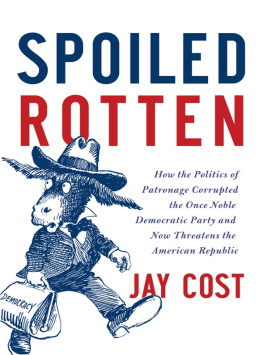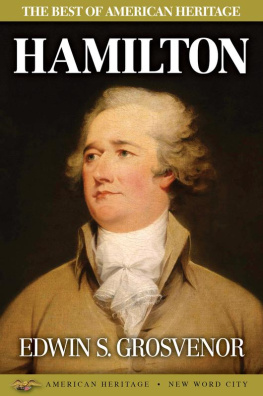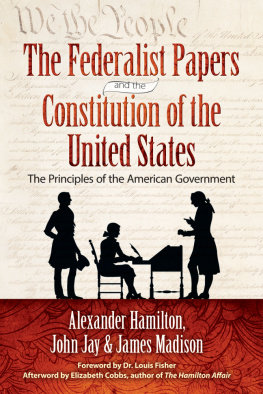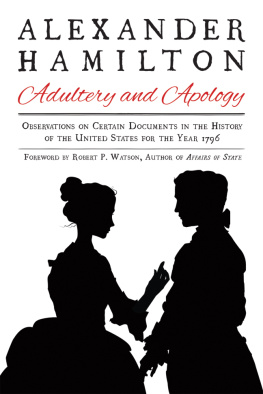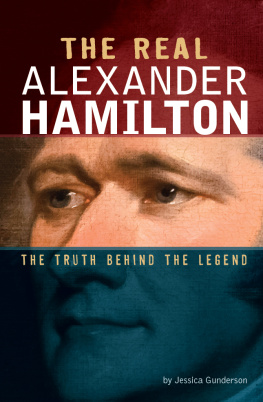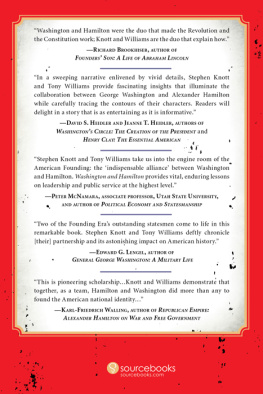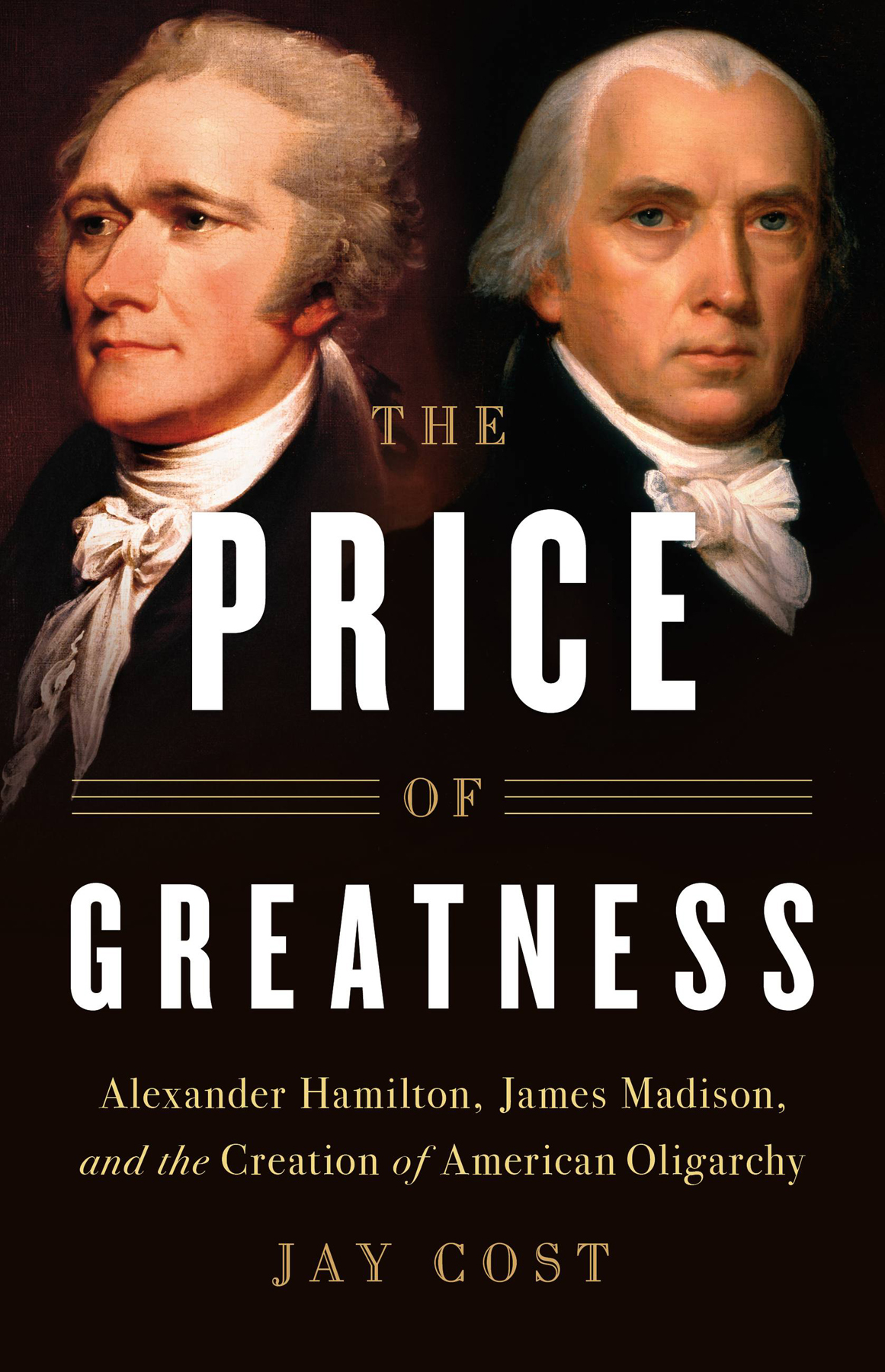For the convenience of the reader, I have altered the spelling, capitalization, and punctuation of historical passages to make them conform to modern conventions. No substantive changes of any sort have been made to direct quotations.
L IKE FASHION, A MERICAN political biography is notoriously faddish. With the exception of a few hardy perennials like Abraham Lincoln and George Washington, historical figures often fall in and out of favor with biographers. Not that long ago, Thomas Jefferson and Andrew Jackson were popular subjects, but interest in them has waned noticeably in recent years. Lately, more attention has been paid to Alexander Hamilton and James Madisonperhaps more so than at any point since their own times. Hamilton was the subject of a widely acclaimed 2004 biography by Ron Chernow, which reintroduced the first secretary of the treasury to Americans and inspired the award-winning Broadway hit Hamilton. There will probably never be a musical written about Madison, a quiet, diminutive planter from Virginia, but he has also enjoyed a renaissance and has been the subject of many scholarly treatments in recent years as well as of biographies geared toward a mass audience, including one written by Lynne Cheney, the former second lady of the United States.
This renewed interest in Madison and Hamilton is richly deserved. Too young to lead the country into the Revolutionary War, they were nevertheless among the heroes who helped save the peace. Having ascended to the summit of American politics by the mid-1780s, they were indispensable in framing the Constitution. Remarkably well educated, politically savvy, and possessing the boldness that comes naturally with youth, they helped draft the new government at the Constitutional Convention and then defended it in the Federalist Papers and at the Virginia and New York ratifying conventions. These two giants of the early republic are well worth our attention.
Yet despite this recent revival, little has been written about the relationship between Madison and Hamilton. This leaves significant gaps in their stories. Not only were they central actors in the early years of the new republic, but their stories are inseparable. Though they were close allies and even friends in the 1780s, they became bitter rivals in the 1790s. After the project of framing a new government was finally completed, they turned on each other, and their dispute led to the first partisan political divide in our country. What happened? And more important, what does their falling-out tell us about the Constitution, our government, and our politics? More than two hundred years later, these questions continue to linger.
J AMES M ADISON J R. was born on March 16, 1751, into a family with a large estate in the Piedmont region of Central Virginia. He went to the College of New Jersey (now Princeton University), where he was instructed by the influential Scottish Presbyterian minister John Witherspoon, a signer of the Declaration of Independence. In 1776 Madison entered the Virginia House of Delegates, where he fell into the orbit of Thomas Jefferson. This was the start of a lifelong friendship and one of the greatest political partnerships in American history.
Alexander Hamilton, the illegitimate child of James Hamilton and Rachel Faucette, was born on the Caribbean island of Nevis on January 11, 1757. Abandoned by his father and orphaned by the death of his mother, his early life was one of hardship and loss. But he was an unusually bright boy, and he landed a job as a clerk at an import-export firm. As a young man, he emigrated to North America and enrolled in Kings College (now Columbia University), where he was soon caught up in the fervor of the revolutionary cause. His courage and intellect placed him in the first rank of young recruits, and George Washington hired him as his aide-de-camp.
In the summer of 1782, Hamilton was named a delegate from New York to the Congress of the Confederation, where Madison had been serving since 1780 as a delegate from Virginia. From that point forward, the fate of the one would be inextricably connected to that of the other. They would seem to make for an unlikely duo. Hamilton was a man brimming with confidence and passion. Having bootstrapped himself from a lowly life in the West Indies to a promising career in American politics, he was convinced he was a man of destiny. Madison, on the other hand, was usually underwhelming on first impression. Short and slight, he had a soft voice and an unassuming disposition. But he was widely known to be a dogged, skillful, and pragmatic legislator.
Background and personality aside, the two had much in common. They were both extremely well read. By the time the Constitution was ratified, Hamiltons only equal on matters of public finance was Robert Morris, and Madisons knowledge of political philosophy was rivaled only by John Adams and Jefferson. They were both formidable debaters and writers; they had thought through virtually every public matter and could defend their views with uncommon skill. They also inclined toward arrogance. Convinced of the rectitude of their own beliefs, they were quick to cast aspersions on those who disagreedincluding, eventually, one another. But that was still years away, when they entered national politics.
In November 1777, the newly freed colonies adopted a new governing charter, called the Articles of Confederation, which called for just a firm league of friendship among the thirteen states, each of which retained its sovereignty. There were no federal courts and no executive branch, and Congress was endowed with little real authority. The result was a national power vacuum, which was filled by state governments looking out for themselves. Madison and Hamilton were determined to fix that.


